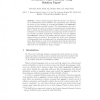Free Online Productivity Tools
i2Speak
i2Symbol
i2OCR
iTex2Img
iWeb2Print
iWeb2Shot
i2Type
iPdf2Split
iPdf2Merge
i2Bopomofo
i2Arabic
i2Style
i2Image
i2PDF
iLatex2Rtf
Sci2ools
117
click to vote
ECOOP
2007
Springer
2007
Springer
Declarative Object Identity Using Relation Types
Object-oriented languages define the identity of an object to be an address-based object identifier. The programmer may customize the notion of object identity by overriding the equals() and hashCode() methods following a specified contract. This customization often introduces latent errors, since the contract is unenforced and at times impossible to satisfy, and its implementation requires tedious and error-prone boilerplate code. Relation types are a programming model in which object identity is defined declaratively, obviating the need for equals() and hashCode() methods. This entails a stricter contract: identity never changes during an execution. We formalize the model as an adaptation of Featherweight Java, and implement it by extending Java with relation types. Experiments on a set of Java programs show that the majority of classes that override equals() can be refactored into relation types, and that most of the remainder are buggy or fragile.
Address-based Object Identifier | ECOOP 2007 | Object Identity | Programming Languages | Relation Types |
Related Content
| Added | 07 Jun 2010 |
| Updated | 07 Jun 2010 |
| Type | Conference |
| Year | 2007 |
| Where | ECOOP |
| Authors | Mandana Vaziri, Frank Tip, Stephen Fink, Julian Dolby |
Comments (0)

